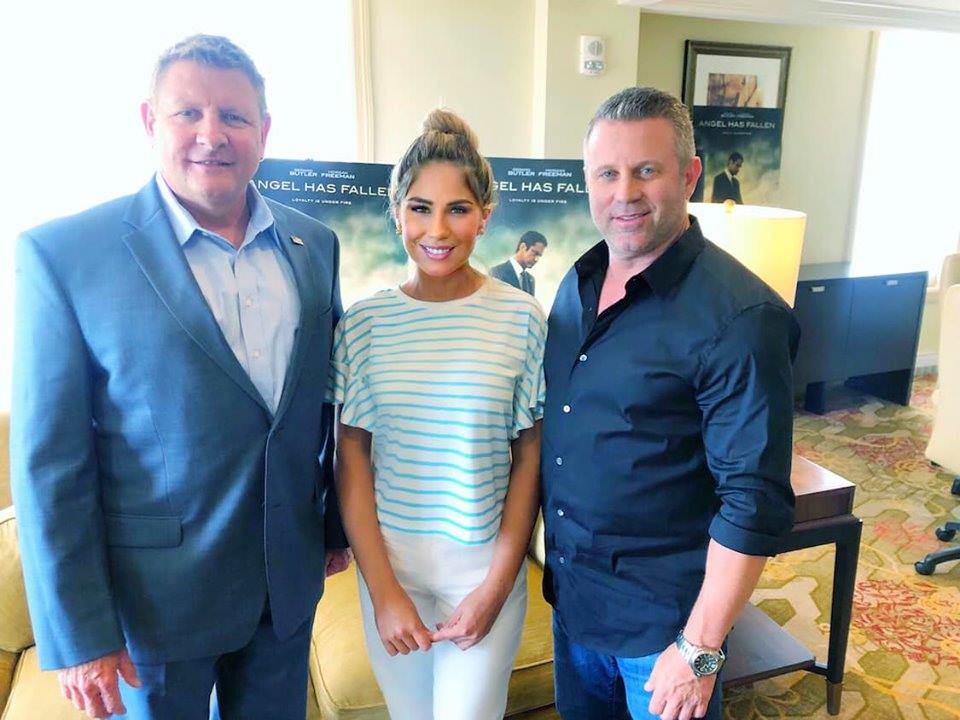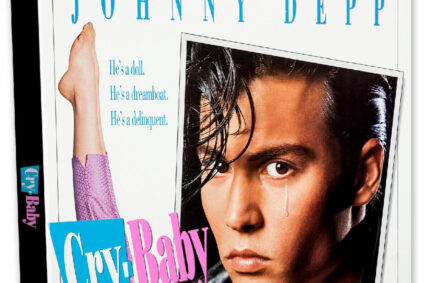
THIS WEEK on the INTERVUE, I had the chance to talk to Director Ric Roman Waugh and Mickey Nelson, Technical Advisor and Former Assistant Director of the Secret Service in the Office of Protective Operations about the action thriller Angel Has Fallen.
In the third installment in the popular HAS FALLEN franchise, when there is an assassination attempt on U.S. President Allan Trumbull (Morgan Freeman), Mike Banning (Gerard Butler) is wrongfully accused and taken into custody. Desperate to uncover the truth, Banning turns to unlikely allies to help clear his name, keep his family from harm, and save the country from imminent danger.
Ric, what made you jump at the chance to direct the third installment of this film since you weren’t onboard for the first two movies?
Ric Roman Waugh (RRW): I’d known Gerard Butler for about thirteen years now and had been wanting to work together and had been a big fan of the London Has Fallen & Olympus Has Fallen franchise. So, he called me to come onboard to do this third installment, but we wanted to do something new. We wanted to take the action packed ride of the first two movies and create more of an origin story this time so that if you hadn’t seen the first two movies, you can come into this franchise brand new and experience something that’s unique and different.
The first two movies were event movies. They were about the taking the White House in Olympus Has Fallen; London Has Fallen was about trying to assassinate the world leaders in London. We wanted this one to be about the man, Mike Banning, so that you got a chance to see what it would be like to be a day in the life of the Secret Service, and how somebody that’s a career service member, what they go through. The hardships that they face, the struggles at home, the addiction to adrenaline and how hard it is to give up the gun to where you chase that adrenaline rush for the rest of your life, a lot like pro athletes or military that we’re seeing now in special operations.
Mickey Nelson, it was the first time you saw the film. What was it like to see the action on screen?
Mickey Nelson (MN): Well, last night was the first time I had the honor to see the movie, and it was an adrenaline rush, to say the least, but it also enabled us to kind of highlight the day to day struggles and challenges of the men and women of the Secret Service, and Ric—I had to thank him for that—was able to humanize the characters of the Secret Service, and kind of show them for the first time as not robots, but actual true people with families; with spouses; with children, and had to deal with the day to day struggles like everyone else in life.
How did you team up with Ric to advise the film?
MN: We’ve known each other for a few years now, and we had talked about different things and trying to do different projects together, so it was a real honor and privilege when Ric asked me to be a part of Angel Has Fallen.
RRW: Yeah, what Mickey brought to the table was, I didn’t need to teach Gerry Butler how to hold a gun. It wasn’t that kind of technical advice we were looking for. It was much more of…again, humanizing the Secret Service and using Mickey’s vast experience as a Secret Service agent to influence not only Gerry, but the entire cast in the way that it felt like a day in the life of what they go through; the hardships, the emotions, what it means to do the job, the honor and the duty and the sense of that commitment of trying to protect somebody that’s one of the most important people in the world.
You were able to balance a dose of comedy with the action thriller we are used to the first two films. How important was that to you?
RRW: Well, yeah we definitely wanted to carry the action packed ride of the first two movies, but you know, I’ve been entrenched with the Special Operations community for a number of years, and law enforcement. And Mickey and I talked about that with his tenure in the Secret Service. You know, you have those high-stress jobs, you use levity as a way to release the pressure, and I found that evident throughout all the different types of military groups, law enforcement groups, first responder groups.
And so, we brought that to this table as well. You see them do what we call “smoking and joking” to…a way to vent the high pressure situations that they’re constantly in, so we use levity as a tool, not only to entertain the fans and make it a big action packed ride that has a lot of good humor to it, but also to be very organic to the way they are in real life.
I like the father and son dynamic that was portrayed in the film with Gerard Butler and Nick Nolte. Talk about the chemistry that we see with the two actors.
RRW: Yeah, it’s the wonderful world of Nick Nolte. You get these great actors and you hope that they’re going to have chemistry together; but the minute Nick and Gerry were onscreen together, even starting to rehearse, we knew it was there, and it became like magic. We, of course, scripted everything, but then you get these moments of improvisation where you just let them loose and do their thing, and what I love about Nick Nolte and Gerry is they took it very seriously.
Gerry did a lot of in-depth research with Mickey, even already making two movies about an agent named Mike Banning, he still took it to new heights with this one with his research and dedication to get it right. Nick Nolte did that as a Vietnam vet. We connected him with Special Operations community, people that had deal with PTSD had dealt with all these issues so that even though his humor and his levity would come through, we wanted what he was talking about to resonate with this community that they understood that he was representing them in a way that it was truthful what was coming out of his mouth.
Mike, you even had a few scenes in the film. Tell us about playing a Secret Service agent on film?
MN: Well, I joked with Ric—it came up kind of spur of the moment—I’d like to tell everybody I tried out for it against twenty other people, but that wasn’t the case with Ric.
RRW: (laughs)
MN: So, it was a spur of the moment thing with Ric, and he said “hey, you’re going to be in the next scene. Let’s get him ready.” I thought it was a joke. Seriously? Until they came up and handed me a suit and tie and I was in the scene. So, it was different, it was fantastic. What I found out quickly though, that if I messed it up, I got to do a take two, take three, which I needed by the way, whereas in real life with the Secret Service, we never got a take two or take three. So, that was the big difference.
Talk to us about the physical and mental toll a Secret Service agent goes through in the line of duty to what we see with Mike Banning in this film. Talk to us about the authenticity portrayed in the film.
MN: Well, I think as the movie was obviously very entertaining, it was an adrenaline rush. But it was also able to capture some of the challenges, as I said before, that the Secret Service has with emerging technologies. Everything in technology that can be used for good it seems like somebody can figure out how to use it for evil. So, the Secret Service challenge and the first responder’s challenge and the military’s challenge is to stay one step ahead of that adversary, and that represents some of the real challenges out there to our first responder’s world today.
Ric, what were some of the challenges you had making the film while still honoring what was done in the first two?
RRW: Yeah, I mean that’s a great question, because we didn’t want to rob the audience of what they loved from the first two movies, but to bring something new, and so for me, I wanted to bring the action and big visceral spectacle that you got in the first two movies, but give you a new level of depth in the characters and also, a bit of an origin story of Mike Banning. Not only do you know more about where Mike Banning came from, what makes him tick, what are the hardships he’s facing now; being addicted to the adrenaline rush of the job, a career man with a gun on his hip.
What that entails, the struggles at home, how hard would it be? Would he keep that job no matter what? But also, we wanted to capture a day in the life of the Secret Service in general, you know? And to make it feel like what it would be like to be behind the scenes so that you’re gripped emotionally with these characters. You’re not watching mindless action where it doesn’t matter who dies. You’ve been embraced with these people, so then when people are killed or things happen, you’re emotionally attached to the action that’s happening as well.
What do you hope audiences will take away from this film?
MN: Ok. I just hope, again, that they see the challenges, the real world challenges that are out there today for all of our first responders, and they should be very thankful that those people are out there, willing to stand a post; willing to rush into a fire for all of us.
RRW: I hope that we did a good job of balancing a big summer action movie with the spectacle you’d expect to come from that, but also with an emotional attachment to the trajectory of this story and these characters, to be embraced in this world, to follow the narrative in a way that you’re actually attached to it versus just watching things blow up, but you enjoy the spectacle at the same time, so hopefully, I’ve balanced it right where I’ve given you enough character and enough depth and enough complexity to attach you to the story, but at the same time, have a good laugh, eat some popcorn and watch a good movie.
Angel Has Fallen – IN THEATRES THIS FRIDAY!


